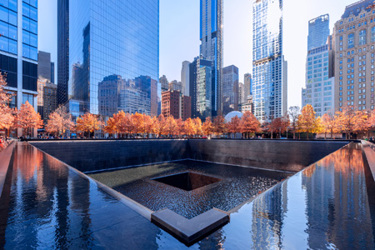WWEMA Window: Coming Together
By Vince Baldasare

September 11, 2021, marked the 20th anniversary of 9/11. It’s been two decades (or approximately one generation) since the world watched in shock and horror as the Twin Towers of the World Trade Center collapsed. That morning, across the United States, millions of water-and-wastewater-industry-related employees were on the job, certainly not expecting the tragedy that unfolded.
On that day, I was in the office with my coworkers, hearing the news that an aircraft hit one of the towers. Originally, I passed it off as an unfortunate accident due to aircraft engine or pilot error. Sadly, moments later, I heard about the second aircraft hitting the second World Trade Center Tower and now theorized, along with my coworkers, that this must be an attack on our country. As the events developed, so did the conversations in the office, but they eventually lead to almost complete silence. Phones went quiet and email notifications stopped. The workday ended at 10:03 a.m. with the crash of Flight 93 in Shanksville, Pennsylvania. Then, calls began to loved ones local and far away. My family had a relative employed by the federal government who worked in the Pentagon as a General in the Defense Department. We immediately needed to know he was safe, and fortunately, for us, he was. His office was on the opposite side of the building from the crash site and was undergoing renovation, so he was not in the Pentagon at the time of the attack. Comforting for us, but heartbreaking for others — as thousands of American lives were lost that day.
That day, communities, neighborhoods, and organizations came together in support of each another all across the U.S., united in support for those who lost lives and those who gave their lives for our country trying to save others. We were and remain grateful for our families, friends, and coworkers and are still united in support of one another. Twenty years later, we are reminded of this support on that tragic day.
How is this related to the water industry? Directly, it isn’t. Indirectly, it is because of how we came together as a unified nation to work together after that event. The rebuilding of our infrastructure requires us to reset our mindsets with a renewed focus for clean water strategies that will require us to work together. Immediately following 9/11, pressure was placed on our water utilities to address terrorism threats. Cybersecurity was an emerging concern, but not an immediate risk. I recall in my hometown enhanced security being implemented at the water treatment and wastewater facilities after 9/11. As we began to settle back into daily routines in the following weeks and months, we watched as this enhanced security was then relaxed. With COVID-19 and the general anxiousness of Americans, similar concerns and threats have resurfaced today. Advocating for clean drinking water is one of our most important public health responsibilities. Ignoring the importance of maintaining access to clean drinking water can only make it more difficult for us to remain safe and free from illness.
I know I have said this previously, but the same still applies today — we cannot take our eye off the ball during a time of unexpected crisis. Instead, we must stay focused on technological advances in equipment manufacturing, as well as new product innovations. We must remain steadfast with the new normal as we keep driving forward.
I am excited to see our growth coming out of the pandemic. Our aging infrastructure, our population growth, and the focus on lead line removal and assisting small and disadvantaged communities have those of us involved in municipal equipment manufacturing expecting a positive impact as we near the end of COVID-19 pandemic. It is too early to know the effect of the Infrastructure Investment & Jobs Act (H.R. 3684); however, early signs are encouraging. We need to keep the pressure on our governmental leaders in support of quality water and wastewater equipment and come together once again for the communal good.
The health, safety, and protection of our water supply is an ongoing challenge. We need to remain focused as leaders in the industry on the continued development of technology. We need continued governmental regulations, including the support of the EPA, to ensure the reduction of pollution in the bodies of water that supply our drinking water systems. More needs to happen. I encourage you to become an advocate for safe drinking water, and join or participate in an organization that advocates for clean water. WWEMA uniquely represents the interests of water and wastewater equipment manufacturers related to regulatory, legislative, and policy issues concerning clean water and technology application. WWEMA is ‘the voice of water and wastewater technology providers.’ Its mission is to promote the advancement of technology solutions for clean water that ensures a future, sustainable environment while improving its members’ economic viability. With a likely once-in-a-generation investment in water infrastructure, it’s time to come together once again!
Vince Baldasare is Sales Manager at The Gorman-Rupp Company and a member of the Water and Wastewater Equipment Manufacturers Association (WWEMA) Board of Directors and the incoming Board Chair for 2022. WWEMA is a non-profit trade association formed in 1908 to represent water and wastewater technology manufacturers and related service providers. WWEMA is made up of many of the most prominent and influential companies in the industry who are working together to shape the future of water and wastewater technology in the U.S. and around the world. For more information about WWEMA, go to www.wwema.org. You are also invited to follow WWEMA on LinkedIn at https://www.linkedin.com/company/wwema/. Interested in becoming a WWEMA member? Contact WWEMA Executive Director, Vanessa Leiby at vanessa@wwema.org.
